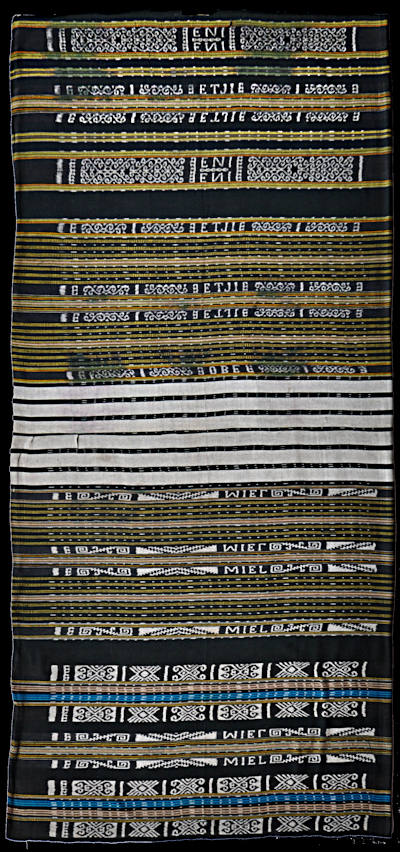| |
 
 | | | |
049 Moluccas, Tanimbar
Tais (sarong) 
| | Locale: | Yamdena, probably | | Period: | Late colonial to early 1950s | | Yarn: | Cotton, hand-spun, very fine, double-ply | | Technique: | Warp ikat | | Panels: | 2 | | Size: | 93 x 141.5 cm (3' 0" x 4' 7") LW: 1.52 | | Weight: | 290 g (10.2 oz), 110 g/m2 (0.36 oz/ft2) | | Design: | Asymmetric pagi-soré (morning-afternoon) design, with starkly different top and bottom half. The clearly drawn intricate motifs reveal the hands of an accomplished weaver. Most of the drawing was done of skeins of merely four yarns. It is not clear how this asymmetric sarong was created. Was it made in parallel with a twin (in which case the ikating would indeed have been done on eight yarns)? Or did the dyer create two short entirely different panels independently, working on four yarns only? Unusual lettering, spelling Betjie, Miel and Eni, probably indicating names of the weaver and/or family members. On Yamdena this type of sarong is called a tais marin, on Fordata a bakan maran. | | Comment: | This sarong stands out by its extremely light weight. Its specific weight is in the very lowest class archipelago-wide, bringing to mind Marianne van Vuuren's observation that Tanimbarese weavers are capable of spinning strong yet extremely fine yarn (van Vuuren (2009:37). Dating this sarong is problematic.While the use of synthetic dyes suggests late manufacture, the hand-spun yarn shows an advanced degree of degradation, which suggest intensive use over a fairly long time. The precision of the ikat work also points to relatively early rather than to late manufacture. | | Background: | Chapters on Moluccas and Tanimbar. | | Sources: | Tentative identification as originating on Yamdena based on Van Vuuren, Ikat from Tanimbar, List of Motifs, Figs. 136, 142. 147. | | |

©Peter ten Hoopen, 2025
All rights reserved.
|
|


